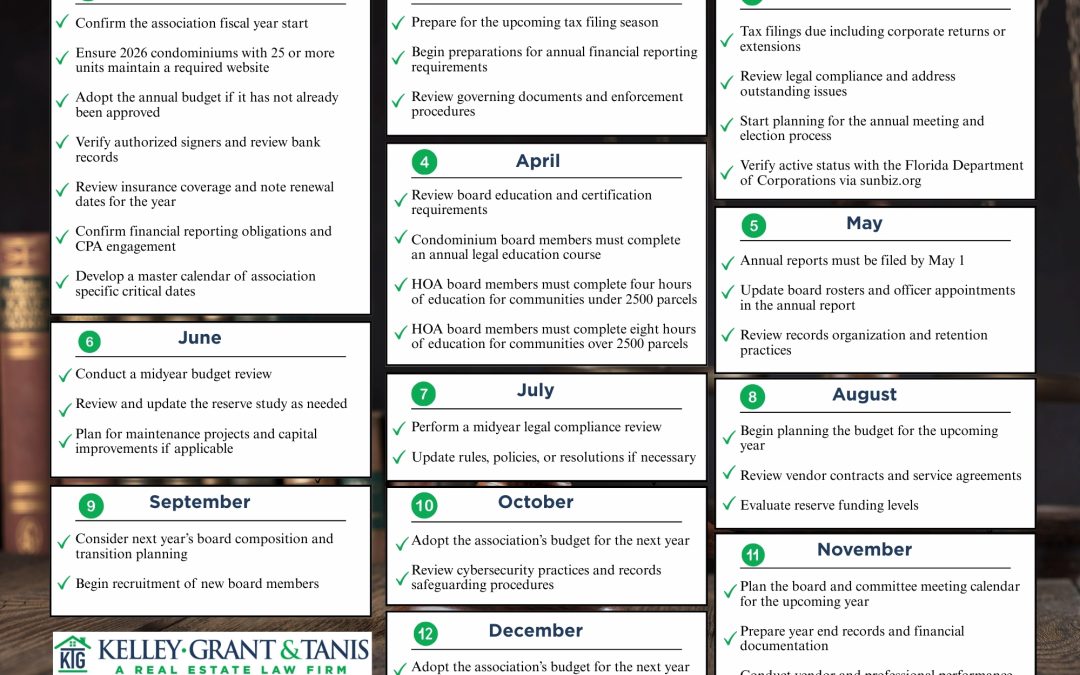Articles
Articles

Association Planning Calendar 2026
Effective association governance requires consistent planning, timely compliance, and proactive decision making throughout the year. This 2026 Association Planning Calendar provides a month by month overview of key financial, legal, operational, and governance...
Commercial Lease Disputes in West Palm Beach: Tenant Rights and Landlord Remedies
Quick Answer Commercial lease disputes in West Palm Beach involve different legal frameworks than residential tenancies because Florida Statutes Chapter 83 primarily governs residential leases while commercial arrangements operate under general contract law principles...
Estate Planning for West Palm Beach Retirees: Avoiding Probate in Palm Beach County
Quick Answer West Palm Beach retirees can avoid Palm Beach County probate proceedings through strategic estate planning including revocable living trusts that hold real estate and financial accounts, transfer-on-death (TOD) designations for bank accounts and...
Converting West Palm Beach Properties to Short-Term Rentals: Legal Requirements and Restrictions
Quick Answer West Palm Beach prohibits short-term rentals (defined as occupancy periods less than six months and one day) in most residential zoning districts, effectively banning Airbnb, VRBO, and vacation rental operations throughout large portions of the city....
West Palm Beach Lease Agreement Essentials: What Landlords Must Include in 2026
Quick Answer Florida residential lease agreements must include specific mandatory disclosures and comply with statutory requirements under Chapter 83, Florida Statutes to be enforceable in Palm Beach County Court. Essential elements include accurate property address...
Buying Property Near Clematis Street: Legal Due Diligence Checklist for West Palm Beach Downtown Real Estate
Quick Answer Downtown West Palm Beach properties near Clematis Street require specialized legal due diligence beyond standard residential purchases because of Community Redevelopment Agency (CRA) regulations, mixed-use zoning complexities, historic district...
West Palm Beach Landlord’s Guide to Florida Statute 83.56: Handling Security Deposits Legally
Quick Answer Florida Statute 83.56 establishes strict procedures for security deposit handling that West Palm Beach landlords must follow to avoid penalties equaling three times the deposit amount plus attorney fees. Landlords have 15 days to return deposits in full...
West Palm Beach Real Estate Closing Costs: What Buyers and Sellers Actually Pay in Palm Beach County
Quick Answer Palm Beach County real estate transactions involve specific closing costs that vary based on purchase price, property type, and local customs. Sellers typically pay for owner's title insurance (approximately 0.5-0.7% of purchase price), documentary stamp...
3-Day Notice Mistakes That Cost West Palm Beach Landlords Their Eviction Cases
Quick Answer Florida's three-day notice requirements under Florida Statute 83.56 demand precise formatting, accurate tenant identification, correct calculation of notice periods, and proper delivery methods. One mistake in any of these areas gives Palm Beach County...

New Requirements for Condominium and Cooperative Associations
What This Means for Your Association Effective July 1, 2025, all condominium and cooperative associations in Florida are required to create an online account with the Department of Business and Professional Regulation (DBPR) and provide the requested information. This...
Contact Us Today!
Fill out the form below and we will be in touch with you as soon as possible.
Recent Posts
- Association Planning Calendar 2026
- Commercial Lease Disputes in West Palm Beach: Tenant Rights and Landlord Remedies
- Estate Planning for West Palm Beach Retirees: Avoiding Probate in Palm Beach County
- Converting West Palm Beach Properties to Short-Term Rentals: Legal Requirements and Restrictions
- West Palm Beach Lease Agreement Essentials: What Landlords Must Include in 2026
Call Us!
Contact Us today to see how we can help.
